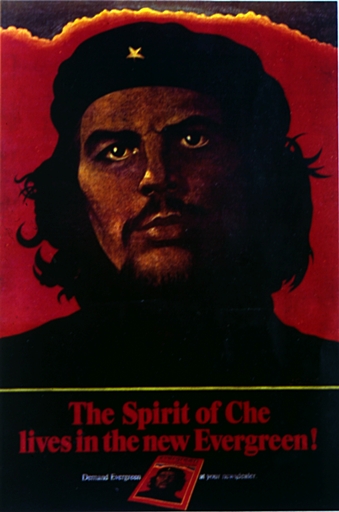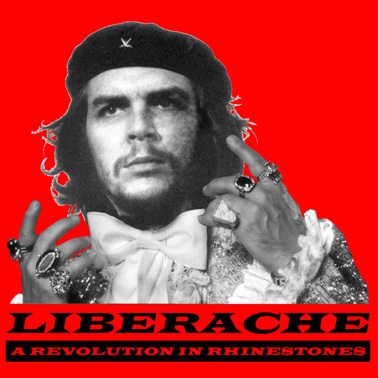http://www.chesafterlife.com/images/
The Legacy of an Image
PHOTOS AND GRAPHICS FROM THE BOOK, ARRANGED INTO FIVE ALBUMS
Moving a family from one hemisphere to another is a time-consuming exercise.
But that’s a poor excuse for the long hiatus in updates to the blog. I think it’s best that I publicly acknowledge the influence of one of my favorite Aussie bumper stickers. In bold, colorful, all-caps, it read “PROCRASTINATE NOW!”
So, without further ado…Live from New York, it’s … The Image Mirror?
It’s funny how the world continued to go on without me or my blog during these past two months - including, it seems, book reviews. Some of the more notable ones to weigh in on Che were The Nation, The L.A. Times, Curled Up With a Good Book, The Learned Fan Girl. Mostly good, I’m very happy to say.
One review, however, begs comment. But before I do, a warning: Writers who tell you they are happy to read criticism of their work are lying.
Anyway, I was oddly satisfied to find Maurice Isserman’s review at The Nation segue from a mostly very positive analysis into a critique of my dehistoricizing of Che. Besides the fact that he misses the whole point of the book – i.e. the central premise that it’s possible to view Che not as a historical figure but as a socially-constructed icon – I can at least now feel confident that I’ve been hit from both the right and the left. I was worried there for a while. All I had was Roger Noriega and the loonies in Miami to go on. Would I forever be labeled as a commie Che lover? Now at least I’m also a guy who – unavoidably, apparently, due to his business journalism background – is “overly enamored with the language of advertising and consumption.” As proof of how I’ve purged the distorted image presented by Noriega et al, I can now happily report that one poor, misguided conservative has defended me against Isserman by – wrongly, of course – describing my work as an “anti-Che book.” A golden rule of journalism holds that if you’ve pissed off both sides you’ve done your job. I hope that means I can rest easy.
Album: On the Trail of Che, Uncategorized

The original photo by Alberto Korda, March 5, 1960, showing the profile of Argentine journalist Jorge Massetti to the left and the fronds of a Cuban palm tree to the right. © Estate of Alberto Korda
Album: From Photo to Pop Icon, Images

…Cropped by Korda, the image loses it historical and geographical markers, and becomes El Guerrillero Heroico. © Estate of Alberto Korda
Album: From Photo to Pop Icon, Images

…In 1968, Jim Fitzpatrick traces the outline of Korda’s photo. Image courtesy of the artist; © Jim Fitzpatrick, 1968
Album: From Photo to Pop Icon, Images
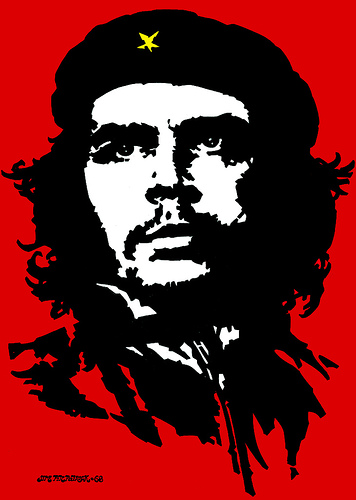
…Later, in various colored forms but especially in red, Fitzpatrick’s image becomes a hit among protesters in Paris and other hot spots of resistance in the late 1960s. © Jim Fitzpatrick, 1968
Album: From Photo to Pop Icon, Images

…Fitzpatrick’s image becomes the template for countless other knockoffs, including “The Warhol Che”. But Andy did not make this commonly reproduced image. No one knows who did it.
Album: From Photo to Pop Icon, Images

…Cuban artists took to the image with abandon, cranking out Che pop art posters. Whether intentional or not, it’s an association that links Che, the armed warrior, with the freewheeling, free-love spirit of the hippy peace movement. Painting by Raúl Martínez. Collection of El Museo Nacional de Bella Artes, Havana. Image courtesy of the Center for Cuban Studies, New York
Album: From Photo to Pop Icon, Images

…Also by Raúl Martínez, this one typifies many artists’ fixation on different elements of Korda’s image, in this case El Comandante’s star on his beret. Collection of El Museo Nacional de Bella Artes, Havana. Image courtesy of David Kunzle.
Album: From Photo to Pop Icon, Images

…Or, in this one, the focus is on Che’s hair, a classic 60s symbol of freedom. La Boina del Che (Che’s Beret), Rubén Alpizar and Reinerio Tamayo. Image reproduced courtesy of the artists. Photo by Michael Casey
Album: From Photo to Pop Icon, Images
…Artist Paul Davis produced what is thought to be the first reproduction of the image in the United States, in this case for the cover of the political journal Evergreen. Its mimicry of Italian Christian art marks the beginning of another strain of Che art, that which deifies him. Image courtesy of the artist; © Paul Davis
Album: From Photo to Pop Icon, Images
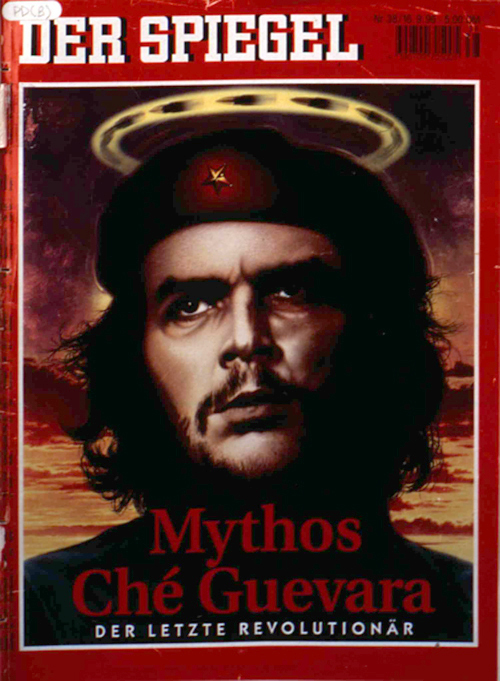
…A later example: this 1996 cover of German magazine, Der Spiegel. Image courtesy of David Kunzle.
Album: From Photo to Pop Icon, Images
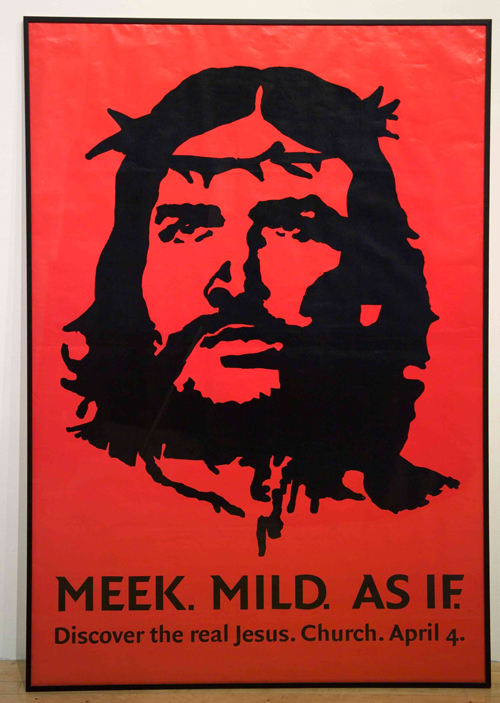
…Or for another twist, there’s this reversal of the same idea – comparing Christ to Che – in a U.K. church advertising campaign poster. Image courtesy of The Churches Advertising Network.
Album: From Photo to Pop Icon, Images

…And as the idealized myth of Che becomes distant from the daily reality of a country that is communist in name but which is, for better or worse, increasingly integrated into the global capitalist economy, Cuban artists can’t resist using the image as a commentary on that society. This riff on Warhol and government propaganda is by Cuban Alfredo Manzo Cedeño. From Michael Casey’s personal collection.
Album: From Photo to Pop Icon, Images

A hand-painted “piquetero” flag among political banners at a rally organized by supporters of President Nestor Kirchner in Argentina, May 2006. Photo by Michael Casey
Album: Che Reverence, Images

The ubiquitous red Che flag at a March 2007 rally to commemorate the Argentine military coup of 1976. Photo by Michael Casey
Album: Che Reverence, Images

The same flag at the same March 2007 rally accompanies a sheet of photos and names of Argentina’s “disappeared” carried by the Mothers of the Plaza de Mayo. Photo by Michael Casey
Album: Che Reverence, Images

Murga dance troupe leader Gustavo Alonso shows his allegiance to Che. The words on his drum are taken from a famous Guevara phrase: “Trembling with indignation over any injustice committed.” Photo by Michael Casey
Album: Che Reverence, Images

Activist youths from Argentina’s Jovenes de Pie movement. The banners contains another famous Che phrase: “I am not a liberator; liberators do not exist. It is the people who liberate themselves.” Photo by Natalie Brady; © Natalie Brady/Faction Films
Album: Che Reverence, Images

Boy in an Buenos Aires slum, one of the Jovenes de Pie banners behind him. Photo by Natalie Brady; © Natalie Brady/Faction Films
Album: Che Reverence, Images
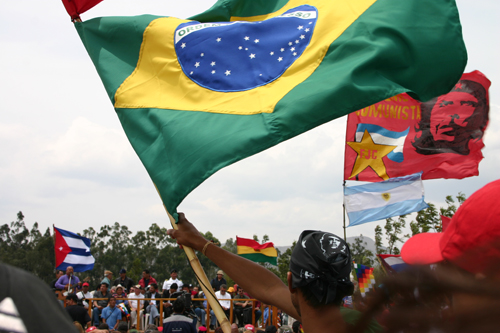
Visitors from around Latin America attended a rally in Vallegrande, Bolivia, on October 9, 2007 for the 40th anniversary of Che’s death in nearby La Higuera. Photo by Josefina Tommasi.
Album: Che Reverence, Images
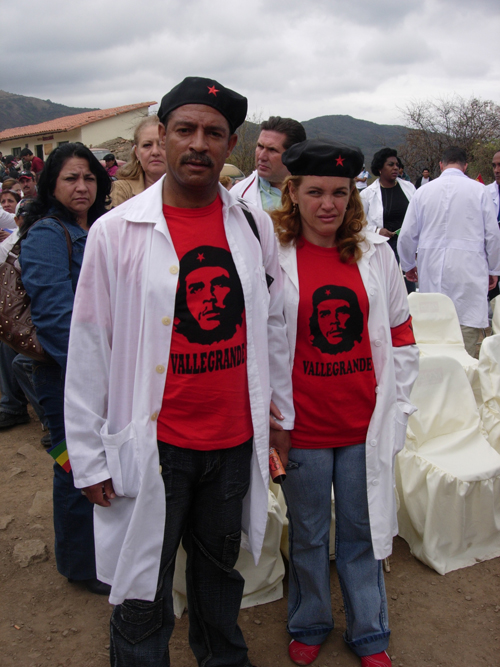
Cuban doctors seconded to Bolivia at the annual October 8 Che anniversary in La Higuera. Photo by Michael Casey
Album: Che Reverence, Images

For some people, the expression “Be Like Che” applies to the physical appearance, too. Like Elvis impersonators flocking to Graceland, Che lookalikes can be found at the annual anniversary of Guevara’s death in La Higuera.
Album: Che Reverence, Images

Plastic flower arrangement and calling card for a Che Guevara cultural center for children in Samaipata, Bolivia, are placed on the Vallegrande hospital laundry room wash basin. It’s the site where Che’s body lay after he was executed on October 9, 1967. Photo by Josefina Tommasi.
Album: Che Reverence, Images

A Che stencil alongside those of Bolivian President Evo Morale (right) and unidentified politician (center) on a political mural in La Paz, Bolivia. Photo by Michael Casey
Album: Che Reverence, Images
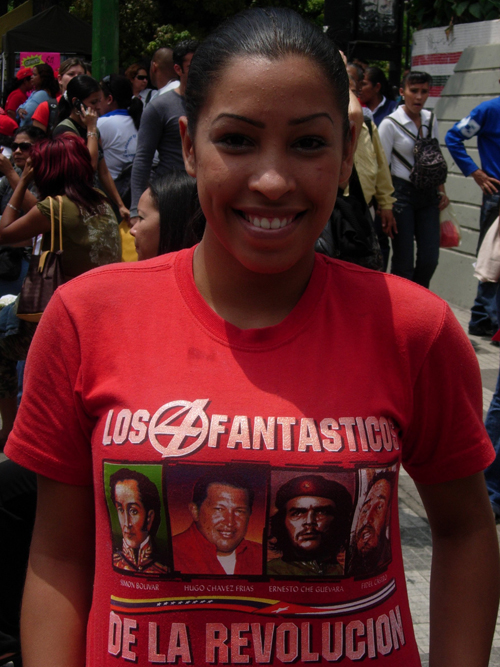
A Venezuelan woman at a rally in favor of President Hugo Chavez, Caracas. Her “Fantastic Four of the Revolution” T-shirt shows the images of Símon Bolivar, Chavez, Che and Fidel Castro. Photo by Michael Casey
Album: Che Reverence, Images

The idealized myth of Che Guevara and his unwavering commitment to a cause translate variously into different fields of endeavor, where the icon simply connotes endurance and determination. Here, a mountain climber at the summit of Mt. Fuji, Japan, wears the image on his sleeve. Photo by Pablo Bertorello Rodriguez.
Album: Che Reverence, Images

For others, Che is a straight symbol of rebellion and freedom. Perhaps that’s why the image appears on this motorcycle in Mauritius. Photo by Anton Bowker-Douglass.
Album: Che Reverence, Images

Packaging for a Che Guevara wig sold in Buenos Aires. Photo by Michael Casey.
Album: Che Irreverence, Images

Condom. Image courtesy of the exhibition “Revolution and Commerce: Portrait of Che Guevara by Alberto Korda,” curator Trisha Ziff.
Album: Che Irreverence, Images

Magnum ice cream wrapper. The slogan reads “The revolutionary struggle of the cherries was squashed as they were trapped between two layers of chocolate. May their memory live on in your mouth!” Image courtesy of David Kunzle
Album: Che Irreverence, Images
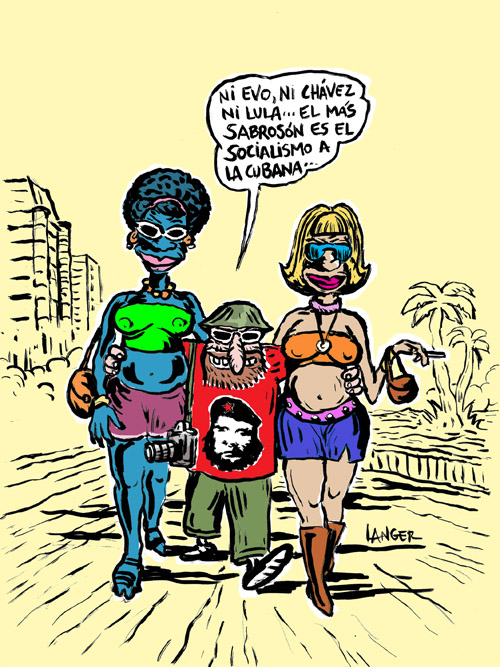
Cartoon by Sergio Langer. Caption reads: “Not Evo, Nor Chávez, Nor Lula…The tastiest form of socialism is Cuba’s.” Image courtesy of the artist.
Album: Che Irreverence, Images

Flyer advertising a talk by Humberto Fontova at the University of Michigan, Ann Arbor. Photo by Taos Turner.
Album: Che Irreverence, Images
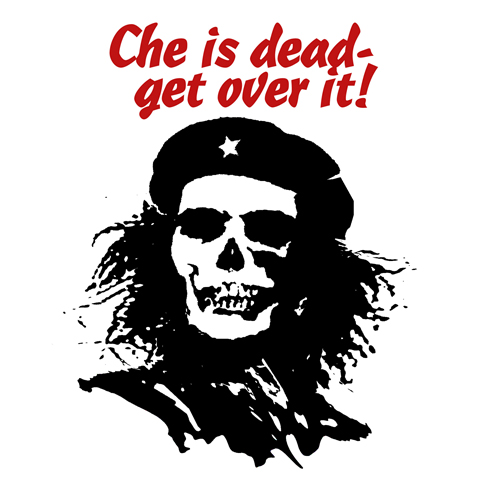
Graphic artist Oleg Atbashian’s Che Is Dead, Get Over It. Courtesy of ThePeoplesCube.com and Che-Mart.com.
Album: Che Irreverence, Images

Products designed by Jimena Chague and Soledad Calvano of Stickme.com.ar, Argentina. Courtesy of the designers. Photo by Michael Casey
Album: Che Commerce, Images

Flyer promoting musical concert, Vallegrande, Bolivia. Photo by Josefina Tommasi
Album: Che Commerce, Images

Truck advertising Che rum and cola drink in Vallegrande, Bolivia. Photo by Josefina Tommasi
Album: Che Commerce, Images

Che’s childhood home in Alta Gracia, Argentina, with a sculpture of him as boy. Photo by Michael Casey
Album: Images, On the Trail of Che

Billboard outside the Che memorial in Santa Clara, Cuba, with the classic Cuban catch cry, “We will be like Che!” Photo by Michael Casey
Album: Images, On the Trail of Che

A monument to Che outside a hospital in Santa Clara. Photo by Michael Casey
Album: Images, On the Trail of Che

Bolivian women at the giant bust of Che in La Higuera. Photo by Michael Casey
Album: Images, On the Trail of Che

Argentine sculptor Andres Zerneri in front of his then-unfinished national monument to Che Guevara, which was eventually cast with the household bronze items of thousands of donors. Photo by Michael Casey
Album: Images, On the Trail of Che

Omar Sandovar, “El Che” of Havana, who charges tourists for his photo in front of Hemingway’s old haunt, the Ambos Mundos Hotel. Photo by Michael Casey
Album: Images, On the Trail of Che

Another Omar. No impersonator this one, Omar Pérez López is thought to be the unrecognized son of Che Guevara. Photo by Michael Casey
Album: Images, On the Trail of Che

Lilia Rosa López, who says she had an affair with Che in 1964 and that he is the father of her son, Omar Pérez. Photo by Michael Casey
Album: Images, On the Trail of Che

Che is everywhere. Look carefully. A photo snapped from a passing car by Jim Della-Giacoma even finds him on Rockaway Boulevard in Long Island, NY. Comfortable in whatever surroundings, here Che occupies a water tank next to a “Car Spa” car cleaning outfit.
Album: Images, On the Trail of Che
'세상 이야기 > 세계' 카테고리의 다른 글
| August Landmesser, The Man Behind The Crossed Arms (0) | 2013.12.11 |
|---|---|
| 가깝고도 먼 ‘세 지붕’ 쿠르드족 /시사IN 20131206 (0) | 2013.12.08 |
| The Marinaleda Model /New Compass 20130329 (0) | 2013.09.29 |
| [스크랩] 스페인의 소도시 `마리날레다` (0) | 2013.09.29 |
| Che Guevara - At the United Nations, 1964 UN (0) | 2013.08.28 |
